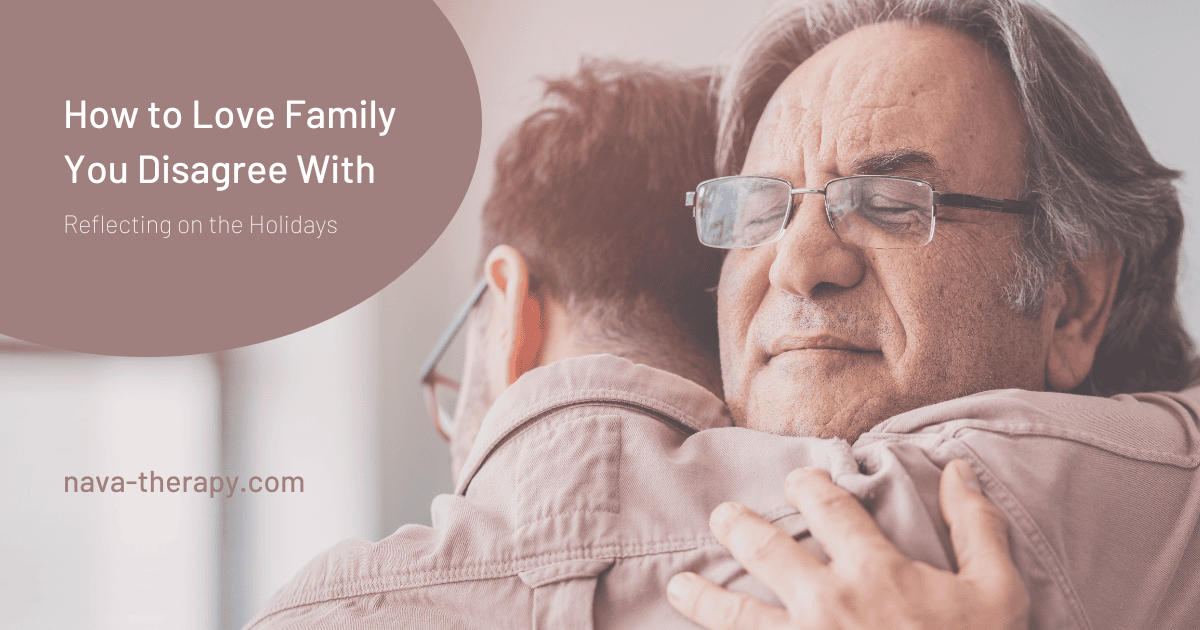
The holiday season often brings opportunities for meaningful connection through family gatherings, but it can also highlight differences that create tension. Many people leave Thanksgiving and Christmas gatherings with a mix of joy from spending time with loved ones and frustration over difficult conversations, particularly in a politically charged climate like the one following the 2024 presidential election.
At Nava Therapy, we know how challenging it can be to balance love and disagreement within families. While it’s natural to focus on the tension, reframing these experiences, appreciating your time together, and building stronger relationships moving forward is also possible. Here’s how to learn from these moments, empathize with family members, and maintain a loving connection.
Understanding Family Conflicts
Understanding Family Conflicts
Family conflict is a natural and inevitable part of family life. It can arise from various sources, including differences in values, personalities, and expectations. Understanding the root causes of family conflict is essential to resolving it effectively. Family conflicts can be categorized into two types: minor and major. Minor conflicts are everyday disagreements that can be resolved through effective communication and compromise. Major conflicts, on the other hand, are more severe and can have a lasting impact on family relationships.
Managing Family Conflicts
Managing Family Conflicts
Managing family conflicts requires a combination of effective communication, empathy, and conflict resolution skills. Family members should learn to express their feelings and needs in a clear and respectful manner. Active listening is also crucial in resolving conflicts, as it helps to understand the other person’s perspective and find common ground. Family members should also be willing to compromise and find mutually beneficial solutions.
Reflect on the Positive Moments
Reflect on the Positive Moments
It’s easy to dwell on the disagreements, especially when the topics feel personal or divisive during family events. However, every family gathering is made up of countless small interactions. There were likely moments of laughter, shared meals, and meaningful conversations that deserved recognition.
After the holidays, take time to journal about positive memories. Reflecting on what went well can help balance out feelings of frustration and remind you why these relationships matter.
Practice Empathy for Family Members’ Perspectives
Practice Empathy for Family Members’ Perspectives
Family members who hold opposing views often come from different lived experiences. While it’s not your responsibility to agree with or justify a family member's behavior, understanding their perspective can foster empathy and reduce resentment.
Ask yourself:
What might have shaped their beliefs?
How might their life experiences differ from mine?
Empathy doesn’t erase conflict but can create a foundation for connection.
Don’t Let Disagreements Define the Relationship
Don’t Let Disagreements Define the Relationship
Holiday conversations, especially around politics, can get heated, but it’s important not to let these moments overshadow the broader relationship. The love you share with family is bigger than one argument, and disagreements don’t have to mean disconnection.
Consider contacting family members to express gratitude for their presence during the holidays, despite any hurt feelings that may have arisen. This gesture isn’t about reopening sensitive topics—it’s about reaffirming your relationship. A simple message like, “I appreciated seeing you during Christmas—it meant a lot to me,” can go a long way.
Conflict Resolution Skills
Conflict Resolution Skills
Conflict resolution skills are essential for resolving family conflicts effectively. Family members should learn to approach conflicts in a calm and respectful manner, focusing on finding mutually beneficial solutions rather than “winning” the argument. Conflict resolution skills include active listening, empathy, and problem-solving. Family members should also be willing to compromise and find common ground.
Learn to Let Go of Unresolved Tensions
Learn to Let Go of Unresolved Tensions
Not every disagreement needs to be resolved immediately, but learning to resolve family conflicts can reduce stress and allow you to focus on what you value about the relationship. Some differences may remain, and that’s okay. Learning to let go of the need for closure can further alleviate tension.
Strategies for letting go:
Practice mindfulness techniques to release lingering frustration.
Remind yourself that loving someone doesn’t require agreeing with everything they say.
Shift your focus to future interactions and how you want those to feel.
Setting Boundaries
Setting Boundaries
Setting boundaries is essential for maintaining healthy family relationships. Family members should establish clear boundaries and expectations for behavior, communication, and conflict resolution. Boundaries help to prevent conflicts from escalating and promote respect and understanding among family members. Family members should also be willing to communicate their boundaries clearly and respectfully, and be open to negotiating and compromising when necessary.
Follow Up Out of Love, Not Obligation
Follow Up Out of Love, Not Obligation
After the holidays, take the initiative to reach out to other family members—not to revisit difficult topics but to nurture the relationship. A small connection can help repair tension and show that you value the bond, even when you don’t agree.
Consider sending a handwritten note or scheduling a casual phone call. Keeping the conversation light and loving can help rebuild warmth without reopening wounds.
Appreciate the Complexity of Family Relationships
Appreciate the Complexity of Family Relationships
Families are rarely perfect, and understanding the family culture can help in appreciating the effort needed to stay connected. They blend personalities, histories, and perspectives that can sometimes clash. Acknowledging this complexity doesn’t diminish the challenges—it deepens your appreciation for the effort needed to stay connected.
Think about what you’ve learned from your family, even through disagreements. What values have they passed on? How have they shaped your understanding of the world?
Seek Support for Personal Growth
Seek Support for Personal Growth
If family dynamics feel particularly strained, therapy can be an invaluable resource for processing emotions and improving mental health. At Nava Therapy, our licensed therapists, including Nishani Jayawardena, Shelby McCliggott, and Dr. Silvia G. Leija, are here to guide you through the complexities of family relationships with compassion and expertise.
Moving Forward with Grace and Empathy
Moving Forward with Grace and Empathy
The tensions of the holiday season don’t have to define your relationships with family members, and addressing such conflicts can strengthen these connections by focusing on positive moments, practicing empathy, and following up with love while protecting your emotional well-being.
Remember, the holidays are just one chapter in your family’s ongoing story. Each interaction allows you to grow, forgive, and deepen your bond.
If you’re ready to explore tools for navigating family dynamics and enhancing your emotional well-being, Nava Therapy is here to help. today to take the first step toward greater connection and understanding.

